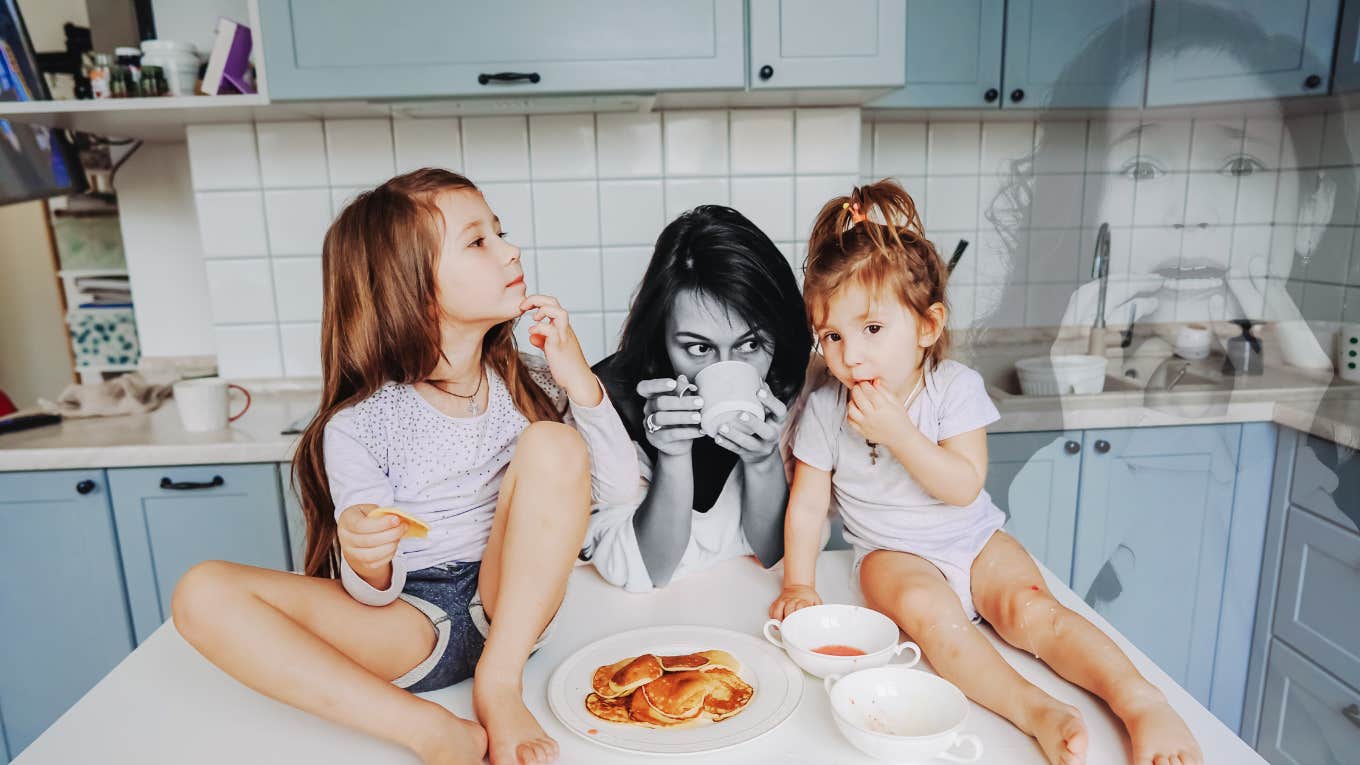I Was An Anxious Kid — And Now I’m A "Let It Go" Mom
Don't let you anxiety become your child's.
 Hrecheniuk Oleksii, Konstantin Postumitenko | Canva
Hrecheniuk Oleksii, Konstantin Postumitenko | Canva “Be careful.” “There are crazy people in the world.” “You could break your neck.” “You could choke.”
Growing up, admonishments about lurking danger were our bread and butter. My parents’ anxiety made sense to them and was not something that they wanted to change. The 1980s media obsession with abducted children further exacerbated their fears. Between the danger-focused atmosphere in our home and my sensitive temperament, I developed severe anxiety.
I cannot remember a time as a child when I thought of the world as a safe or friendly place. I ruminated about drowning, choking, or being bitten by dogs, I was obsessed with not getting bad grades, and I was terrified of social rejection. My anxiety interfered with my sleep and gave me nightmares, headaches, and stomachaches. I was too nervous to approach other children and ended up lonely, socially unpracticed, and awkward.
I am often very sad thinking about how many opportunities I squandered as a child, teenager, and even young adult to have fun, try new things, meet new people, and experience the world in a free and easy way. It is also discomfiting to realize that, had I met my children when I was a child, they would have intimidated me.
My oldest daughter, 4 ½, is a sensitive child like I was, but she assumes that people she meets at school, the grocery store, or the playground will want to be her friend. She considers it fun, not dangerous, to climb high, although she is naturally fairly cautious so her “high” wasn’t that high until recently. And, best of all, she can empathize with others’ perspectives, assuming that if another child doesn’t want to play, she may be having a bad day or feeling cranky. As a child, I would have ruminated over this rejection for weeks.
My daughter doesn’t worry frequently about her health or physical safety. Recently, when she was on the playground with an older child who kept telling her to “be careful,” she was confused and came over to me to ask why. I take partial credit for this.
I have committed to raising my children in a very different environment than the fear-constrained one of my childhood.
Observing that my oldest child was temperamentally similar to me gave me even more motivation to ensure that she not be given the environmental cues that could trigger the development of an anxiety disorder. I resolved to show no anxiety around my kids, cold turkey when my oldest daughter started crawling. I realized that when I watched her too intently, she would become still and watch me back, trying to figure out where the danger was.
I learned to bite my tongue each time she fell, or approached a dog in the park, or, later, balanced precariously on the monkey bars. I also began to approach other moms at the park to strike up conversations and show my daughter how friendly the world could be. I encouraged her to approach other children too, even those whom I, as a child, would have considered intimidating.
Eventually, I stopped hearing my internalized anxious voice when my daughter climbed to the top of the playset (she could fall!), took too big a bite of food (she could choke!), or came close to the stovetop (she could get burned!). The voice quieted and then left. I also didn’t have to brace myself before striking up a conversation with a mom I didn’t know. Magically, my anxiety went away. (Well, really, it was from doing the equivalent of cognitive behavior therapy, or specifically, exposure and response prevention, on myself).
Sometimes my more laissez-faire approach has backfired, like when I realized that my oldest daughter did not know why she should be cautious of moving cars in a parking lot because I had so assiduously avoided mentioning the idea of physical danger. And of course, any parenting approach must be tailored to the needs of the individual child. I have said “be careful” a lot more with my second and third children, who are more reckless and impulsive. But overall, I think a low-anxiety parenting style has helped my children feel free, joyful, and excited about life.
 Evgeny Atamanenko / Shutterstock
Evgeny Atamanenko / Shutterstock
As a therapist, I often see anxious parents, who say things like, “Isn’t over-protection better than your child being kidnapped?” The first line of defense against allowing these anxieties to grow is to do a review of the statistics. There are very low chances that a child will be, for example, kidnapped by a stranger, or will break his leg falling from the monkey bars.
But if you’re truly anxious, no statistic can reassure you because you’ll always say, “But I don’t want my kid to be that one in a million.” I empathize with this perspective, and I know that love is at the root of this protective, anxious response.
But it is easier to fix a broken leg than to cure an anxiety disorder. There is always a chance that your child will get hurt, physically or emotionally, or even fatally, by taking any risk in life, but there is a much greater chance that an anxious parenting style focused on warding off the specters of danger will make your child anxious.
And anxiety is a burden that no child deserves.
Dr. Samantha Rodman Whiten, aka Dr. Psych Mom, is a clinical psychologist in private practice and the founder of DrPsychMom. She works with adults and couples in her group practice Best Life Behavioral Health.

